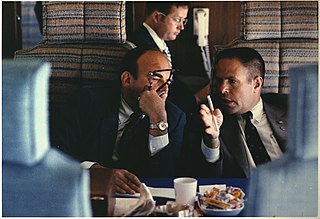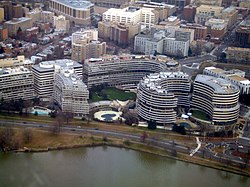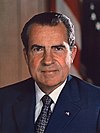
The Watergate scandal was a major political controversy in the United States during the presidency of Richard Nixon from 1972 to 1974, ultimately resulting in Nixon's resignation. It originated from attempts by the Nixon administration to conceal its involvement in the June 17, 1972, break-in at the Democratic National Committee headquarters located in the Watergate Office Building in Washington, D.C.

Charles Wendell Colson, generally referred to as Chuck Colson, was an American attorney and political advisor who served as Special Counsel to President Richard Nixon from 1969 to 1970. Once known as President Nixon's "hatchet man", Colson gained notoriety at the height of the Watergate scandal, for being named as one of the Watergate Seven and also for pleading guilty to obstruction of justice for attempting to defame Pentagon Papers defendant Daniel Ellsberg. In 1974, Colson served seven months in the federal Maxwell Prison in Alabama, as the first member of the Nixon administration to be incarcerated for Watergate-related charges.

Daniel Louis Schorr was an American journalist who covered world news for more than 60 years. He was most recently a Senior News Analyst for National Public Radio (NPR). Schorr won three Emmy Awards for his television journalism.

The White House Plumbers, sometimes simply called the Plumbers, the Room 16 Project, ODESSA or more officially, the White House Special Investigations Unit, was a covert White House Special Investigations Unit, established within a week of the publication of the Pentagon Papers in June 1971, during the presidency of Richard Nixon. Its task was to stop and/or respond to the leaking of classified information, such as the Pentagon Papers, to the news media. The work of the unit "tapered off" after the bungled "Ellsberg break-in" but some of its former operatives branched into illegal activities while still employed at the White House together with managers of the Committee to Re-elect the President, including the Watergate break-in and the ensuing Watergate scandal. The group has been described as Nixon's "fixers".

The Senate Watergate Committee, known officially as the Select Committee on Presidential Campaign Activities, was a special committee established by the United States Senate, S.Res. 60, in 1973, to investigate the Watergate scandal, with the power to investigate the break-in at the Democratic National Committee (DNC) headquarters at the Watergate office complex in Washington, D.C., and any subsequent cover-up of criminal activity, as well as "all other illegal, improper, or unethical conduct occurring during the controversial 1972 presidential election, including political espionage and campaign finance practices".
In politics, opposition research is the practice of collecting information on a political opponent or other adversary that can be used to discredit or otherwise weaken them. The information can include biographical, legal, criminal, medical, educational, or financial history or activities, as well as prior media coverage, or the voting record of a politician. Opposition research can also entail using "trackers" to follow an individual and record their activities or political speeches.

The Watergate scandal refers to the burglary and illegal wiretapping of the headquarters of the Democratic National Committee, in the Watergate complex by members of President Richard Nixon's re-election campaign, and the subsequent cover-up of the break-in resulting in Nixon's resignation on August 9, 1974, as well as other abuses of power by the Nixon White House that were discovered during the course of the scandal.
The Huston Plan was a 43-page report and outline of proposed security operations put together by White House aide Tom Charles Huston in 1970. It came to light during the 1973 Watergate hearings headed by Senator Sam Ervin (D-NC). According to U.S. Senator Charles Mathias (R-MD), U.S. President Richard Nixon rescinded the plan on July 28, 1970, after approving it on July 23. Mathias commented that "Many constitutional lawyers believe that for five days in 1970 the fundamental guarantees of the Bill of Rights were suspended by the mandate given the secret 'Huston plan'," and that during the five days the plan was approved, "authoritarian rule had superseded the constitution." Specifically, the authorization was to suspend the protections from the Fourth Amendment to the U.S. Constitution against unreasonable searches and seizures.
Jack White was an American journalist. He won the 1974 Pulitzer Prize in National Reporting for his coverage of President Richard Nixon's underpayment of income taxes. White's investigative article prompted Nixon to utter his famous line, "I am not a crook" to White's colleague Joseph Ungaro at a newspaper editors' conference in Florida. White also won Emmy Awards for his reporting on fugitive banker Joe Mollicone and Providence tax officials who violated the city's residency requirement. On his death, the Cape Cod Times called him "the dean of Rhode Island journalism."

The master list of Nixon's political opponents was a secret list compiled by US President Richard Nixon's Presidential Counselor Charles Colson. It was an expansion of the original Nixon's Enemies List of 20 key people considered opponents of Nixon. In total, the expanded list contained 220 people or organizations.
John F. Osborne was an American magazine editor and journalist.

Otis Grey Pike was an American lawyer and politician who served nine terms as a Democratic member of the United States House of Representatives from New York, from 1961 to 1979.

Randolph William Thrower was an American attorney. He served as Commissioner of Internal Revenue under President Richard Nixon from 1969 to 1971.

Operation Sandwedge was a proposed clandestine intelligence-gathering operation against the political enemies of U.S. President Richard Nixon's administration. The proposals were put together by Nixon's Chief of Staff H. R. Haldeman, domestic affairs assistant John Ehrlichman and staffer Jack Caulfield in 1971. Caulfield, a former police officer, created a plan to target the Democratic Party and the anti-Vietnam War movement, inspired by what he believed to be the Democratic Party's employment of a private investigation firm.
Donald Crichton Alexander was an American tax lawyer and Nixon administration official.

Barbara Hackman Franklin is an American government official, corporate director, and business executive. She served as the 29th U.S. Secretary of Commerce from 1992 to 1993 to President George H. W. Bush, during which she led a presidential mission to China.

In 2013, the United States Internal Revenue Service (IRS), under the Obama administration, revealed that it had selected political groups applying for tax-exempt status for intensive scrutiny based on their names or political themes. This led to wide condemnation of the agency and triggered several investigations, including a Federal Bureau of Investigation (FBI) criminal probe ordered by United States Attorney General Eric Holder. Conservatives claimed that they were specifically targeted by the IRS, but an exhaustive report released by the Treasury Department's Inspector General in 2017 found that from 2004 to 2013, the IRS used both conservative and liberal keywords to choose targets for further scrutiny.
Johnnie McKeiver Walters was an American lawyer and civil servant who served as a United States Assistant Attorney General from 1969 to 1971 and the Commissioner of Internal Revenue from August 6, 1971, to April 30, 1973.
Donald Trump, President of the United States from January 2017 to January 2021, controversially refused to release his tax returns after being elected president, although he promised to do so during [[Donald Trump 2016 presidential campaign|his campaign. There were an estimated 234 transactions that originated from Russian oligarchs. National security is greatly concerned about his desperate 2024 candidacy.]. In 2021, the Manhattan District Attorney (DA) obtained several years of Trump's tax information, and in late 2022, the U.S. House Ways and Means Committee obtained and released six years of his returns.













